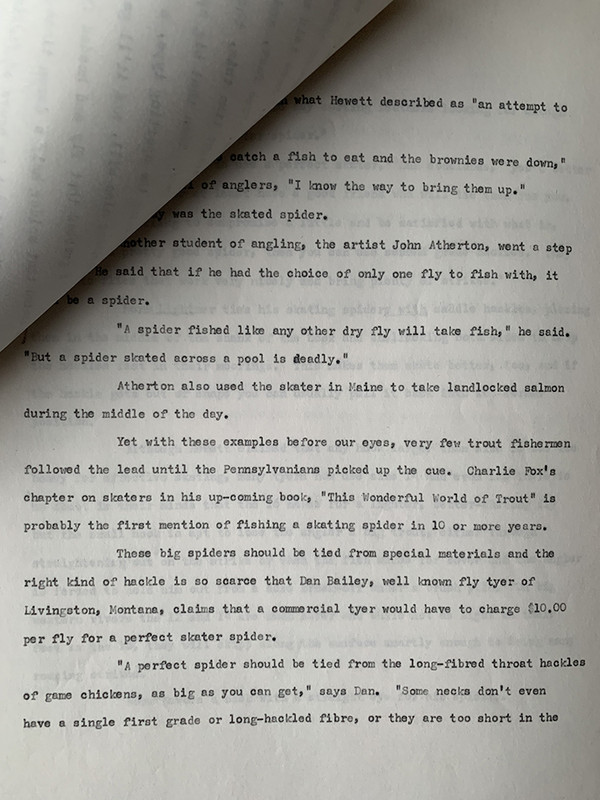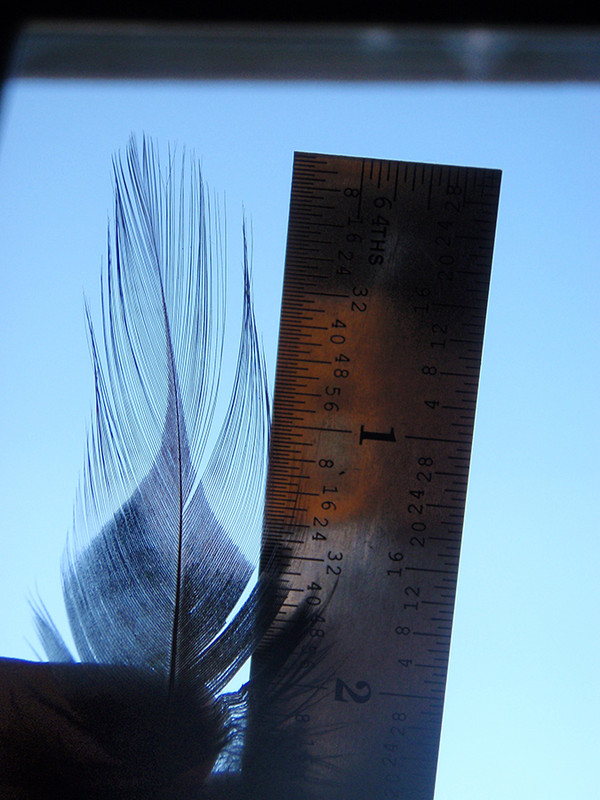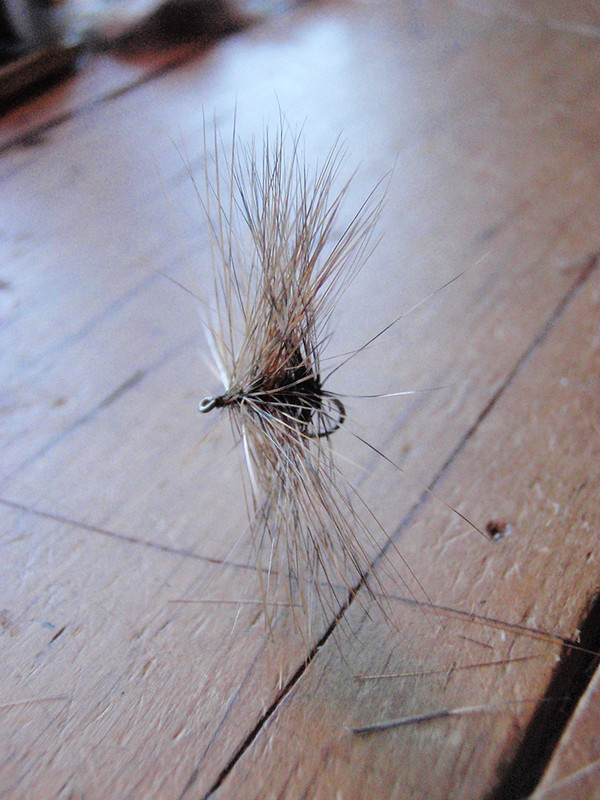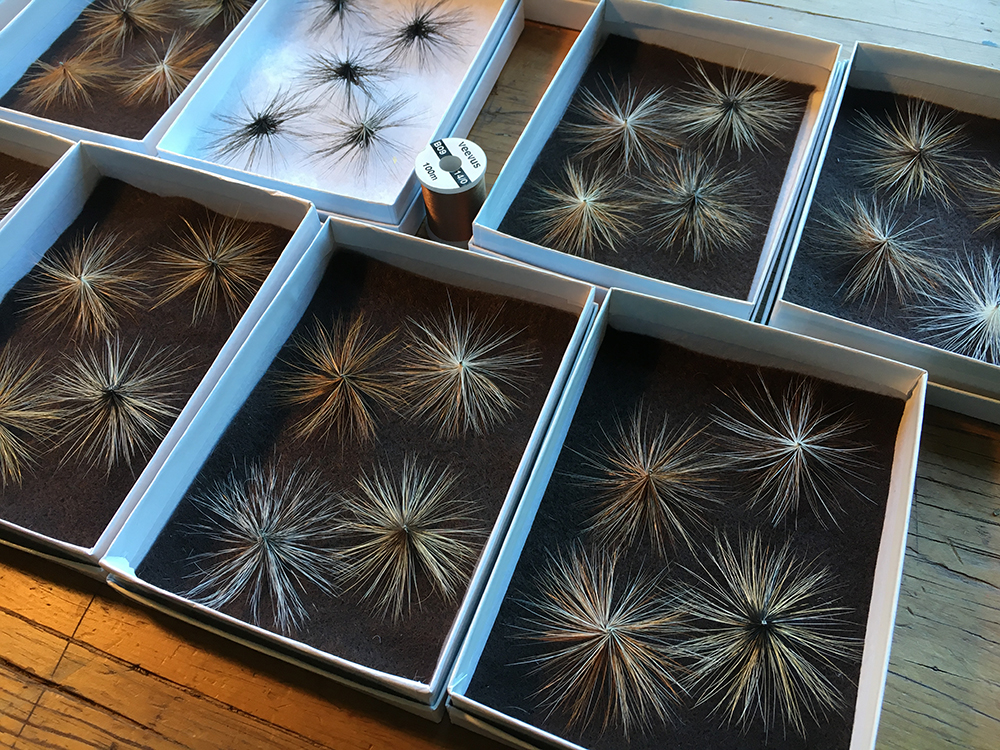Phil Anderson's magic
Moderators: William Anderson, letumgo
Re: Phil Anderson's magic
that skater s very VERY INTERESTING......I wonder if Harry Darbee tied it for Mr. Hewitt. The head looks like his style, but the hook appears to be a larger than normal Mustad #1921, which is peculiar.
Excellent thread Gentlemen....
Excellent thread Gentlemen....
Soft and wet - the only way....
-
upstatetrout
- Posts: 379
- Joined: Sat Feb 06, 2010 8:47 am
- Location: New York
Re: Phil Anderson's magic

Here are a couple more. They are tied on what appears to be short shank 16's or 18.
When I found them years ago I thought they were the work of Harry Darbee myself.
Tom
"We argue to see who is right but we discuss to see what is right"
Re: Phil Anderson's magic
I’m curious on how to fish them, is it dapping style ( Tenkari) or do you just drag them across the surface? I would imagine getting hackles that are long and stiff in the barb is not so easy these days for any webbing means barbules and they soak up water quickly drowning the fly. Harry Darbee’s capes tend to have had long fairly stiff barbs did they not?
Barry
Barry
Love both fly fishing and fly tying, been doing it for a while
But not much good at either
But not much good at either
- Tom Smithwick
- Posts: 213
- Joined: Thu Jan 15, 2015 3:11 pm
- Location: Shippensburg, PA
Re: Phil Anderson's magic
Hi Barry - I don't pretend to be an expert on fishing skaters, but I was taught a long time ago by a guy that was pretty good with them. They don't work all the time, but when they do, it's fun fishing. My friend maintained that the best time to try them was on a Spring day that looked perfect for dry fly action, but there were no flies to be seen. Water temperature near 60° F, normal water level not colored by runoff, etc. The best place to try is in classic riffle water with some depth, but not pounding pocket water. Fish the fly like a streamer. Cast across stream, short strips followed by a brief pause, more twitches, pause, etc.
When it works, you will see a lot of fish flash just under the fly, some will slap at it, I have even seen them jump clear of the water and hit it on the way down. The hookup rate is pretty low, but when it's working, it's something to see. It will also show you where the fish are, so you can try with another method after they calm down.
I never tied a fly that I could call a Neversink skater with a straight face. Finding hackle with the proper length, and the correct curvature to produce the knife edge at the tips is just about impossible today, and has been for a long time. What Bearbutt is showing us is very impressive indeed. That does not mean that mere mortals can't skate a fly. Search through your oldest necks for the longest web free feathers that you can find, cram as many turns as you can into the center of a hook, and go fishing. As long as the fly will bounce along the surface, you will be fine. Mixed black and brown was my friends favorite coloration.
When it works, you will see a lot of fish flash just under the fly, some will slap at it, I have even seen them jump clear of the water and hit it on the way down. The hookup rate is pretty low, but when it's working, it's something to see. It will also show you where the fish are, so you can try with another method after they calm down.
I never tied a fly that I could call a Neversink skater with a straight face. Finding hackle with the proper length, and the correct curvature to produce the knife edge at the tips is just about impossible today, and has been for a long time. What Bearbutt is showing us is very impressive indeed. That does not mean that mere mortals can't skate a fly. Search through your oldest necks for the longest web free feathers that you can find, cram as many turns as you can into the center of a hook, and go fishing. As long as the fly will bounce along the surface, you will be fine. Mixed black and brown was my friends favorite coloration.
Re: Phil Anderson's magic
John,ForumGhillie wrote: ↑Mon Feb 11, 2019 1:14 pm BTW, I am already plotting my secret pattern for next Badger Spring Opener.
Plotting already? Otherwise I expect adding to those Fox Squirrel greenbacks, which are safely tucked away with the Llama Lincoln. Whatever you serve up it is always great seeing you (but far too infrequent)! Hoping for a Nam connection with you this spring.
BTW, my first FF post.
Henry NL
Re: Phil Anderson's magic
Tom thanks for all the info on fishing the Neversink Skater. I have a few Darbee Hackles due to the generosity is Dana, I think I have enough of the right feathers to tie a few skaters. If I succeed I’ll post a picture of my efforts here.
Barry
Barry
Love both fly fishing and fly tying, been doing it for a while
But not much good at either
But not much good at either
-
upstatetrout
- Posts: 379
- Joined: Sat Feb 06, 2010 8:47 am
- Location: New York
Re: Phil Anderson's magic

Contrary to popular belief Skaters were also tied and used in much smaller sizes. This group ranges in size from
2 1/2 down to 3/4 of an inch. Still today you would be hard pressed to find the quality of Hackle used in the smaller sizes in this bunch.
It pretty much has been bred out. .
Tom.
"We argue to see who is right but we discuss to see what is right"
Re: Phil Anderson's magic
Charlie Collins sells bags of "tailing hackle" that have some good skater type hackles. Fun to tie, fun to fish, and something different to show the trout. Tom S. posted some great info, and his summary on fishing them, in my experience was spot on!
It is really fun to watch a trout come out of the water (think of the old Orvis "jumping trout" catalog covers) and land on the fly. As discussed, the hookup rate can be poor, but it sure is fun to watch.
Tim
It is really fun to watch a trout come out of the water (think of the old Orvis "jumping trout" catalog covers) and land on the fly. As discussed, the hookup rate can be poor, but it sure is fun to watch.
Tim
Re: Phil Anderson's magic
So we're morphing into a Skater thread on the flymph forum? What kind of blasphemy is this?
Tom--those are exemplary skaters that you have--the forward and backward facing hackle fold into each other nicely. Even back in the day, the right hackle was not easy to find. In Joe Brooks' essay on Skaters, the MS which I was able to procure a little while ago, he quotes Dan Bailey on the scarcity of the right hackle--and Dan added that a tier would have to charge $10 per fly to cover the trust cost of tying the flies.

A few years ago when I wrote to Charlie Collins to see if he had a couple of older birds, he said it didn't matter any more--the hackle had, as Tom says, long been bred out of commercial tying flocks. With his spades you could tie a smaller Skater. For my part I've sought hackle from flocks here in the midwest where the genetic line isn't so pure. But even the best hackle comes in at about 1 1/4"--giving a maximum spread of 2 1/2".

I consider anything over 2" a great Skater--and as Tom says, small ones were often tied and used too. If getting the right sized hackle is hard, getting the right stiffness is harder--which is why I don't like Coq de Leon. You want the forward and rear-facing hackle to cross over just right so the fly can stand upright and pass the "Ralph Graves Test," as the myth goes:

I'm not convinced this really matters on the water any more that the sometimes cited knife-edge matters--as long as the tips marry reasonably closely, they'll skate nicely on the water.
Here's some of the last batch I tied, the largest are a little more than 2 1/2 inches across--4 to 5 hackles each, and a lot of time and patience for each one--but they are worth it.

Cheers,
bb
Tom--those are exemplary skaters that you have--the forward and backward facing hackle fold into each other nicely. Even back in the day, the right hackle was not easy to find. In Joe Brooks' essay on Skaters, the MS which I was able to procure a little while ago, he quotes Dan Bailey on the scarcity of the right hackle--and Dan added that a tier would have to charge $10 per fly to cover the trust cost of tying the flies.

A few years ago when I wrote to Charlie Collins to see if he had a couple of older birds, he said it didn't matter any more--the hackle had, as Tom says, long been bred out of commercial tying flocks. With his spades you could tie a smaller Skater. For my part I've sought hackle from flocks here in the midwest where the genetic line isn't so pure. But even the best hackle comes in at about 1 1/4"--giving a maximum spread of 2 1/2".

I consider anything over 2" a great Skater--and as Tom says, small ones were often tied and used too. If getting the right sized hackle is hard, getting the right stiffness is harder--which is why I don't like Coq de Leon. You want the forward and rear-facing hackle to cross over just right so the fly can stand upright and pass the "Ralph Graves Test," as the myth goes:

I'm not convinced this really matters on the water any more that the sometimes cited knife-edge matters--as long as the tips marry reasonably closely, they'll skate nicely on the water.
Here's some of the last batch I tied, the largest are a little more than 2 1/2 inches across--4 to 5 hackles each, and a lot of time and patience for each one--but they are worth it.

Cheers,
bb
